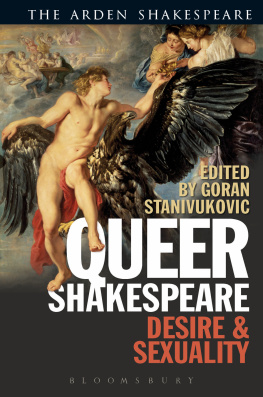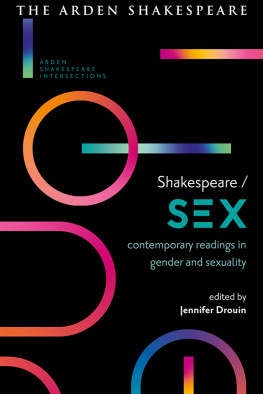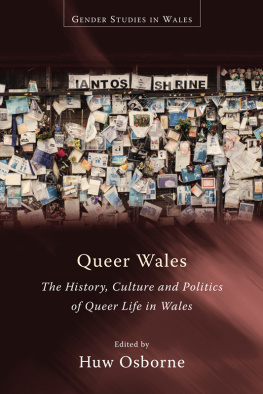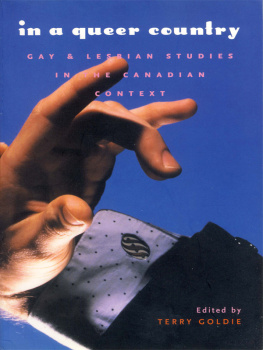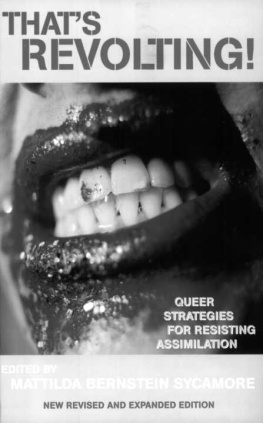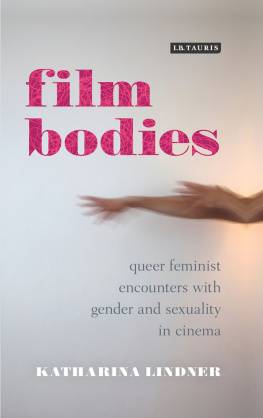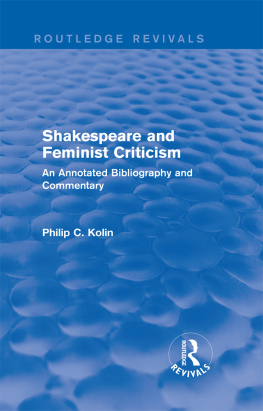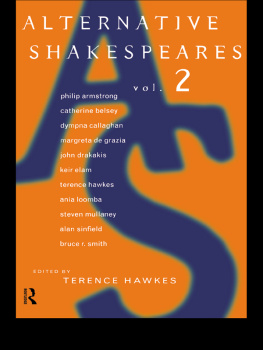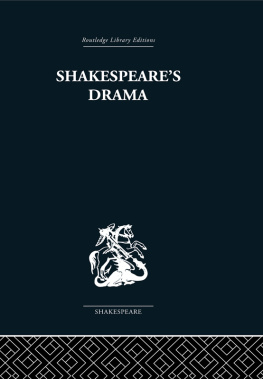Queer
Shakespeare
RELATED TITLES
Broadcast Your Shakespeare: Continuity and Change Across Media
Edited by Stephen ONeill
Queering the Shakespeare Film
Anthony Guy Patricia
Shakespeare and Ecofeminist Theory
Rebecca Laroche and Jennifer Munroe
Shakespeare and Greece
Edited by Alison Findlay and Vassiliki Markidou
Shakespeare and New Historicist Theory
Neema Parvini
Shakespeares Fathers and Daughters
Oliver Ford Davies
Queer
Shakespeare
Desire and
Sexuality
Edited by
Goran Stanivukovic
Bloomsbury Arden Shakespeare
An imprint of Bloomsbury Publishing Plc
CONTENTS
The core of the chapters included in this book originated in the papers discussed at the research seminar Queer Shakespeare, held at the annual meeting of the Shakespeare Association of America in Vancouver in 2015. I am grateful to Vin Nardizzi for responding to the proposal for the seminar with erudition, enthusiasm and skill, and and for his support while the book was in preparation. Will Stockton, Jeffrey Masten and Mario DiGangi responded to the ideas shared in the seminar with generosity, encouragement and critical sharpness. Many of their points shared in the seminar were helpful in the shaping of this book afterwards. Anthony Guy Patricia made many useful comments on a draft of the book. I am grateful to Natasha Hurley who ventured backwards in queer times with intellectual verve typical of her quick mind, and suggested how one might think differently and thought-provokingly about queerness in Shakespeare. I thank John Garrison and Stephen Guy-Bray for sharing their critical wisdom and practical advice with me. I am indebted to Mitch Redden for his help as an exemplary research assistant. It was a great pleasure for me to work with the superb editorial team at Bloomsbury. Margaret Bartleys interest in this project, her expert guidance on numerous matters and her quick e-mail replies made my work on this book a whole lot easier than I anticipated. I acknowledge the financial support from the Social Sciences and Humanities Research Council of Canada at the initial stage of this project. Most importantly, I thank all the contributors for writing intellectually inspiring, fresh and original essays.
Throughout this book, Shakespeares texts are cited from The Arden Shakespeare Complete Works , ed. Richard Proudfoot, Ann Thompson and David Scott Kastan (London: Bloomsbury, 2011). For specific purposes, Arden 3 single editions of Shakespeares works are occasionally used in individual chapters.
Valerie Billing is visiting assistant professor of English at Knox College. Her scholarship has previously been published in Renaissance Drama and The Journal for Early Modern Cultural Studies . She is currently working on a book project titled Size Matters: The Erotics of Stature in Early Modern English Literature and Culture .
Simone Chess is Associate Professor of English at Wayne State University. Her book, Male-to-Female Crossdressing in Early Modern English Literature: Gender, Performance, and Queer Relations (2016) argues that representations of male-to-female crossdressers in literature show models of queer male femininities that are relational and beneficial. She has published articles and book chapters on crossdressing and gender labour, gender and disability, bathroom activities, ballads and Shakespeare, dramatic representations of blindness and oath-making in murderous wife ballads. Her next book project will bring together early modern queer and disability studies.
Holly Dugan is Associate Professor of English at The George Washington University. She is the author of The Ephemeral History of Perfume: Scent and Sense in Early Modern England (2011), co-editor with Lara Farina of a special issue of postmedieval 3 (4) (2012) on the Intimate Senses and co-editor with Karl Steel of an essay cluster in Early Modern Culture (2016) on Fabulous Animals. She is currently working on a book-length monograph that explores the prehistory of primatology through the lens of Shakespeare and performance.
John S. Garrison is Associate Professor of English at Carroll University. He has held fellowships from the American Philosophical Association, Folger Shakespeare Library and National Endowment for the Humanities. With Kype Pivetti, he is co-editor of Sexuality and Memory in Early Modern England: Literature and the Erotics of Recollection (2015). He is the author of Friendship and Queer Theory in the Renaissance (2014) and Glass (2015).
Eliza Greenstadt is Associate Professor at Portland State University, where she teaches in media, aesthetics and literary studies. Her research focuses on gender and sexuality in early modern England, and she has published on a variety of authors from William Shakespeare to Margaret Cavendish. Rape and the Rise of the Author: Gendering Intention in Early Modern England , her first book, was published by Ashgate in 2009. Currently, she is researching a monograph on genital communities with the working title Pricked Out .
Stephen Guy-Bray is Professor of English at the University of British Columbia. He specializes in Renaissance poetry and queer theory. He is currently completing an edition of George Peeles The Old Wives Tale and starting a study of Narcissus and queer inactivity.
Ian Frederick Moulton is Professor of English and Cultural History in the College of Integrative Sciences and Arts at Arizona State University. He has published widely on the representation of gender and sexuality in early modern European literature. He is the author of Love in Print in the Sixteenth Century: The Popularization of Romance (2014) and Before Pornography: Erotic Writing in Early Modern England (2000), editor and translator of Antonio Vignalis La Cazzaria , an erotic and political dialogue from Renaissance Italy (2003), and co-editor of Teaching Early Modern English Literature from the Archives (2015).
Vin Nardizzi is Associate Professor of English at University of British Columbia. His first book, Wooden Os: Shakespeares Theatres and Englands Trees , was published by the University of Toronto Press in 2013. He is currently working on a second monograph project, Marvellous Vegetables in Renaissance Poetry. With Robert W. Barrett, Jr., he is co-editing a forthcoming issue of the journal postmedieval called Premodern Plants, and with Tiffany Jo Stern is editing a collection of essays called Oecologies: Engaging the World, from Here.
David L. Orvis is Associate Professor of English at Appalachian State University. He is editor, with Linda Phyllis Austern and Karl Boyd McBride, of Psalms in the Early Modern World (2011), and, with Ryan Singh Paul, of The Noble Flame of Katherine Philips: A Poetics of Culture, Politics, and Friendship (2015) and author of essays on Shakespeare, Lyly, Marlowe, Herbert and Milton. His current book project focuses on the legacy of Anteros in classical, medieval and early modern literature and culture.
Kirk Quinsland is a Lecturer in the English Department at Fordham University. His current projects include a book addressing antitheatrical writing and its connection to various forms of metatheatricality on the early modern stage, and a digital project to map linguistic connections between the Blackfriars and plays performed at the Blackfriars Theatre.
Melissa E. Sanchez is Associate Professor of English and Core Faculty in the Gender, Sexuality and Womens Studies Programme at the University of Pennsylvania. She is the author of Erotic Subjects: The Sexuality of Politics in Early Modern English Literature (2011) and editor of three volumes: Spenser and the Human , a special volume of Spenser Studies co-edited with Ayesha Ramachandran (2015); Rethinking Femninism in Early Modern Studies: Gender, Race, and Sexuality , co-edited with Ania Loomba (2016); and Desiring History and Historicizing Desire , a special volume of the Journal of Early Modern Cultural Studies , co- edited with Ari Friedlander and Will Stockton (2016).

